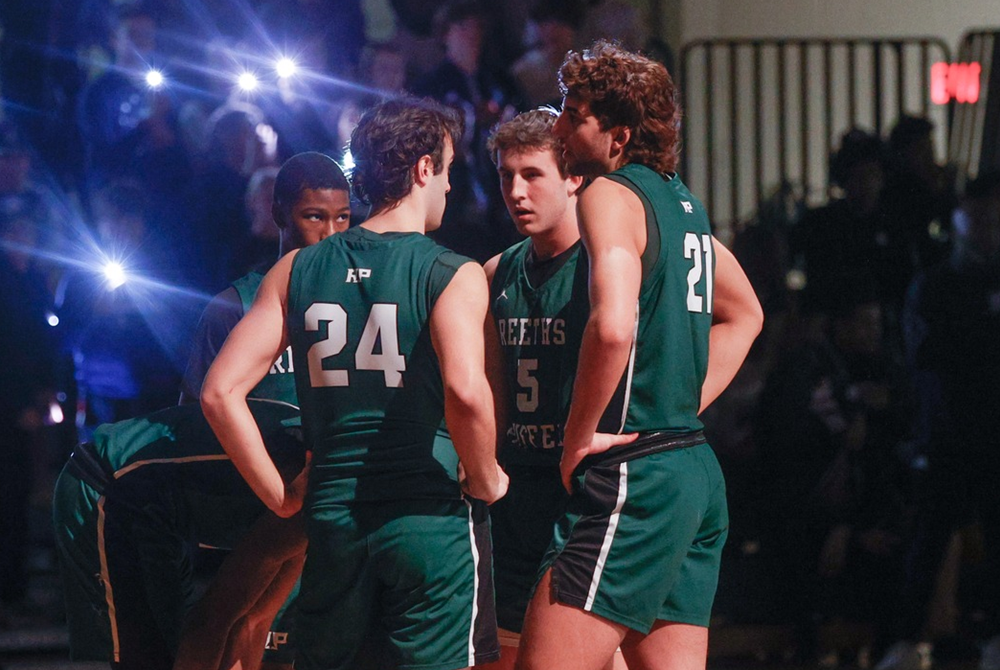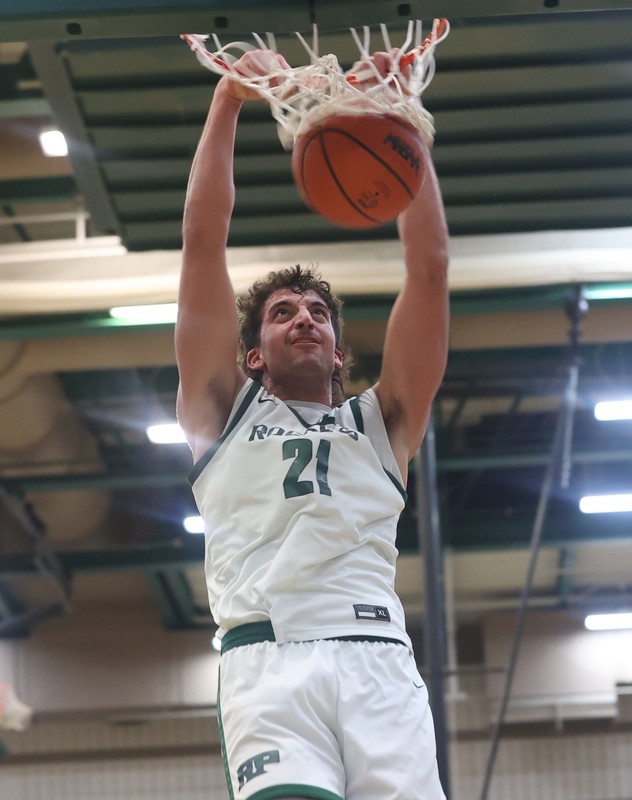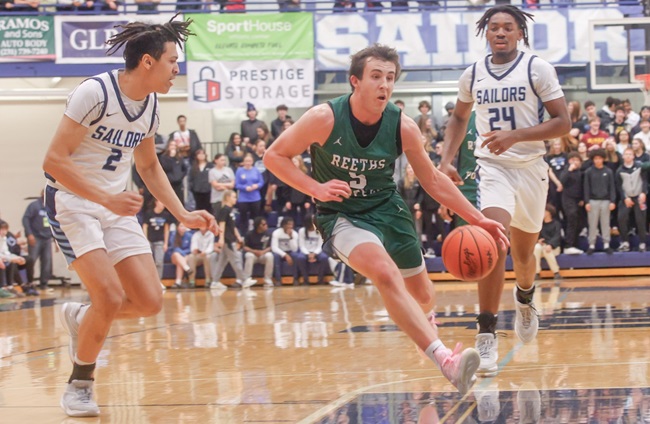
Detroit 'Longtime' Boys Coaches Down to Few
By
Tom Markowski
Special for Second Half
December 14, 2016
Gary Fralick considers himself one of the fortunate ones.
 Fralick, 66, is in his 32nd season as a head boys basketball coach. He retired from his teaching position in 2013. He started coaching at Redford Thurston in 1979, went to Royal Oak Kimball in 1984 and is in 23rd season as the head coach at Troy.
Fralick, 66, is in his 32nd season as a head boys basketball coach. He retired from his teaching position in 2013. He started coaching at Redford Thurston in 1979, went to Royal Oak Kimball in 1984 and is in 23rd season as the head coach at Troy.
Fralick might be lucky, but he is unquestionably rare. Fralick is believed to be one of three coaches in the Macomb/Oakland/Wayne area who has coached for more than 30 seasons.
There’s Dan Fife at Clarkston and Kevin Voss of Clinton Township Chippewa Valley, both of whom in their 35th seasons, all at the same school.
Another, Greg Esler at Warren DeLaSalle, is in his 30th season. He was the head coach at St. Clair Shores Lake Shore for seven seasons before going to DeLaSalle in 1994.
“We’re part of a dying breed,” Voss said.
It certainly appears so. Coaching longevity has taken on a different meaning recently. Twenty seems like a lot in these times, and in reality it is a long time. Twenty years or so ago, 20 years was normal. There’s a new normal, and 20 or 25 years isn’t it.
Many factors have contributed to this change. A person’s personal and family life often don’t coincide with the demands of coaching basketball. The responsibilities that come with coaching have increased. Some coaches say that to be an effective coach, it can be a 10- or 11-month job.
Two factors are at the forefront, and they are both financial. Coaches used to be educators as well as coaches. Yes, coaching can be viewed as teaching on the court, but at one time teaching in a classroom and coaching used to go hand in hand.
 Then there’s the subsidy coaches receive. It varies from school district to school district. Some make $4,000 a season, others can make $7,000. And it also costs money to run a program; unless the coach receives financial help from a booster club or parents, the money he or she receives begins to dwindle.
Then there’s the subsidy coaches receive. It varies from school district to school district. Some make $4,000 a season, others can make $7,000. And it also costs money to run a program; unless the coach receives financial help from a booster club or parents, the money he or she receives begins to dwindle.
But the most important factor is time.
“A tremendous amount of time is devoted to watching DVD or tapes,” Fralick said. “I know I’m dating myself with saying that. The point is, you’re watching a lot. There’s more scouting. And you don’t get paid much. Why don’t they stay as long as they used to? They get burned out. They want to spend more time with their families.
“You don’t see as many of the young coaches stay. Coaches don’t have the ambition to coach a long time. It’s not a profitable job. I don’t know what other coaches make. We used to compare what we made. Not anymore.
“Thirty years or more? I don’t see it happening. There’s the dual job thing. Things have changed. To me, it’s been a great job.”
To compensate for being away from home, Fralick brought his family with him. Sort of. He coached his son Gary, Jr., and Tim. Gary, a 1996 Troy graduate, played for his father his junior and senior seasons and Tim, a 1999 graduate, played four seasons on varsity. Fralick said he was even more fortunate to coach both on the same team (during the 1995-96 season).
Then there’s his wife, Sharon, who remains the scorekeeper.
“I’ve always had a passion for coaching and teaching,” Fralick said. “I love the game of basketball. I love the kids. There’s never a dull moment. It’s been a great ride.”
Vito Jordan has been around basketball all of his life. His father, Venias Jordan, was the boys head varsity coach at Detroit Mackenzie and Detroit Mumford before stepping down as a head coach only to return to the bench assisting his son the last six seasons.
Vito Jordan, 31, became a head coach at Detroit Osborn when he was 24. He started his coaching career the year before as an assistant to Henry Washington at Macomb College. Jordan went to Detroit Community after one season at Osborn and guided Community to its only MHSAA Finals appearance (Class B, 2013). He’s now in his fourth season as the head coach at Detroit Renaissance.
“I followed my father all of my life,” Jordan said. “I knew what I wanted to do when I was in college (Alma College). This is what I want to do the rest of my life.”
It’s different in Detroit. Schools close. Job titles change. Jordan, for instance, teaches at the Academy of Warren, a middle school in Detroit. It’s a charter school, not within the Detroit Public School system, therefore he receives his pay from two separate school systems (Renaissance is in the DPS).
There is a distinction. In some school systems coaches will receive a percentage – let’s say for argument sake, 10 percent – of their teaching salary to coach. Let’s say a person makes $60,000 a year to teach. He or she would then receive $6,000 to coach. If you coach two sports, that’s $12,000.
 Jordan is not privy to such a contract. Each job is separate. Jordan loves to coach, and he understands he must be a teacher to earn a decent living, and he’s content to continue on the path he is following. But he also knows that to make a good salary just coaching one must move on to the collegiate level like others have done.
Jordan is not privy to such a contract. Each job is separate. Jordan loves to coach, and he understands he must be a teacher to earn a decent living, and he’s content to continue on the path he is following. But he also knows that to make a good salary just coaching one must move on to the collegiate level like others have done.
“When there were coaches like my dad, Perry Watson (Detroit Southwestern), Johnny Goston (Detroit Pershing) and others, they all worked in the (Detroit Public) school system. Everyone was teaching. That was your career. None of them had aspirations of being a college coach. Not even Watson. Now everyone isn’t in the teaching profession. Maybe they do have a degree and maybe they don’t. The point is, most aren’t teachers. I can count on one hand those (in Detroit) who have their teaching certificate and coach.”
Jordan noted such successful PSL coaches like Derrick McDowell, Steve Hall and Robert Murphy who left high school to pursue a coaching career in college. Murphy guided Detroit Crockett to the Class B title in 2001 and is now the head coach at Eastern Michigan. McDowell has had two stints as a collegiate assistant coach, most recently at EMU. He’s since returned to coach at Detroit Western. Hall coached Detroit Rogers to three consecutive Class D titles (2003-05) before going to Duquesne University and Youngstown State as an assistant coach. Hall returned to Detroit last season and is in his second season as head coach at Detroit Cass Tech.
Jordan said they left high school to challenge themselves professionally, among other considerations. Voss said there are variables that influence how long a person lasts, in one school district or in coaching in general, that didn’t exist 20 years ago.
“Athletics have become pervasive in high school,” he said. “The whole booster situation you find in college is here. You can be winning but not winning enough. It’s a trickle down affect.
“Coaches complain about parents. Parents complain about playing time. High school sports is not as pure as it once was. Winning is way more important now. Now a coach comes in with a three-year window. You can have one or two down years, and the third you’d better win.
“Then there’s the pressure on your family. I’ve been lucky. My wife and I have had the players over for team dinners. We create a family atmosphere. It’s a change of society. I don’t envy the young coaches coming in.”
Community involvement has always been a priority for Voss. To keep a hand on the pulse, Voss heads the elementary basketball program within the Chippewa Valley school district. Games are held on Saturdays, and approximately 750 students take part.
“You have to have the right fit,” he said. “I’m in the right spot. You coach for different reasons when you get older. I’m enjoying the game. There’s a different level of satisfaction.”
 Tom Markowski is a columnist and directs website coverage for the State Champs! Sports Network. He previously covered primarily high school sports for the The Detroit News from 1984-2014, focusing on the Detroit area and contributing to statewide coverage of football and basketball. Contact him at [email protected] with story ideas for Oakland, Macomb and Wayne counties.
Tom Markowski is a columnist and directs website coverage for the State Champs! Sports Network. He previously covered primarily high school sports for the The Detroit News from 1984-2014, focusing on the Detroit area and contributing to statewide coverage of football and basketball. Contact him at [email protected] with story ideas for Oakland, Macomb and Wayne counties.
PHOTOS: (Top) Troy boys basketball coach Gary Fralick, left, is in his 32nd season coaching. (Middle) Detroit Renaissance boys coach Vito Jordan is following in the coaching footsteps of his father, Venias. (Below) Chippewa Valley boys coach Kevin Voss, left, is in his 35th season at his school. (Top and below photos courtesy of C&G Newspapers; middle photo courtesy of Detroit Public School League.)

Ambrose & Whitaker Teaming Up Again to Power Reeths-Puffer Hoops Surge
By
Tom Kendra
Special for MHSAA.com
February 7, 2024
Travis Ambrose and Jaxson Whitaker love to compete, and they love their school.
 The good friends, who are best known around Muskegon Reeths-Puffer as basketball players, were recruited onto the football team this fall and both made an immediate impact at receiver – with Ambrose getting a Division I scholarship offer from Central Michigan University before playing a varsity game.
The good friends, who are best known around Muskegon Reeths-Puffer as basketball players, were recruited onto the football team this fall and both made an immediate impact at receiver – with Ambrose getting a Division I scholarship offer from Central Michigan University before playing a varsity game.
Last spring, for the heck of it, they played on the tennis team for the first time and crushed it in doubles.
So last week, when the senior duo – arguably one of the best inside-outside tandems in the entire state – led the Rockets to a convincing 63-45 victory at state-ranked Muskegon (the Big Reds’ first home regular-season loss in three years), it was a source of immense pride.
“We wanted to show people that Muskegon isn’t the only basketball power in this area,” explained Ambrose, a 6-foot-8 center who dominated the game on both ends with a triple-double of 24 points, 14 rebounds and 10 blocks.
“People on the East Side think it’s only Muskegon and no one else. We want people to know about Reeths-Puffer.”
Puffer followed up that epic win with another Friday night at rival Muskegon Mona Shores to improve to 15-1 overall and 9-0 in the Ottawa-Kent Conference Green, and jumped into the state’s Associated Press Division 1 rankings this week at No. 9, one spot behind Muskegon.
 “It was a great week for our school,” said third-year R-P coach Nate Aardema. “It meant a lot to get a win like that at Muskegon and that it wasn’t fluky, like banking in a 3-pointer at the buzzer to win. We earned it.”
“It was a great week for our school,” said third-year R-P coach Nate Aardema. “It meant a lot to get a win like that at Muskegon and that it wasn’t fluky, like banking in a 3-pointer at the buzzer to win. We earned it.”
The Rockets, whose only loss came back on Dec. 15 against Hudsonville, are now in position to end a nearly 40-year drought without a conference championship.
It was actually 1985 when R-P won the Seaway Conference title behind star center Mark Hughes, who went on to captain Michigan to a national championship and is now an executive with the Los Angeles Clippers. That was also the last year the Rockets won a District championship.
Aardema knows his team still faces a difficult road to capture those titles, starting with a home rematch Friday night against Muskegon.
That road got rougher Monday night, when Ambrose injured his hip in practice, forcing him to miss Tuesday’s home game against Holland. His absence left a hole in the lineup, especially on the defensive end, as the Rockets barely held on for their 12th straight win, 67-64, after beating the Dutch by 32 points in their first meeting this season.
Ambrose, who grew up in California and came back to his mother’s hometown of Muskegon his freshman year so he could play sports during the COVID-19 pandemic, is hopeful he will be back for Friday’s rematch with Muskegon.
Ambrose (6-8, 240 pounds) is an extremely mobile big man who is averaging 19.5 points per game (and shoots 65 percent from the floor), along with 10.1 rebounds and 3.4 blocks.
His athletic ability was so apparent that CMU football made him an offer at its summer camp, before he had even played a varsity snap. Ambrose validated Central’s confidence with a breakout season last fall – finishing with 25 catches for 304 yards and seven TDs while being recognized as the team’s best blocker at tight end.
“When he got that offer to Central for football, he was in the gym that same day working on basketball,” said Aardema. “I asked him if he was still all-in for basketball, and he told me: ‘Of course. I don’t want to let my team down.’”
Whitaker, a 6-4 shooting guard, was the other key receiver last fall for the Rockets, who finished 7-3 and nearly knocked off Muskegon and Mona Shores on the gridiron as well.
“I’m super-glad that I decided to play football my senior year,” said Whitaker, who, like Ambrose, was recruited by coach Cody Kater after not playing football his junior year. “I learned so much from our coaches and the other guys on the team. It was a great experience overall.”
 Whitaker, who was committed to Ferris State for basketball, is a lethal 3-point shooter who can also use his size and strength to drive to the basket. He is the school’s all-time leader in 3-point shooting and averages 17 points, five assists and four rebounds per game.
Whitaker, who was committed to Ferris State for basketball, is a lethal 3-point shooter who can also use his size and strength to drive to the basket. He is the school’s all-time leader in 3-point shooting and averages 17 points, five assists and four rebounds per game.
Whitaker stepped up with Ambrose out of the lineup Tuesday, going off for 31 points (including six 3-pointers) to go along with six rebounds.
The other senior starter for R-P is 6-4 Antrel Jones, a great passer on the hardwood who, appropriately, was the Rockets’ quarterback on the football field. Jones averages six points, six rebounds and three assists per game.
Rounding out the starting lineup are 6-4 junior Brayden Mitchelson (7.0 points, 5.0 rebounds, 3.0 assists) and 6-1 sophomore Marvin Moore (9.0 ppg), who made four clutch free throws Tuesday night to preserve the victory over Holland.
In addition to the second showdown with Muskegon on Friday, the Rockets have another huge game on Feb. 17 against No. 5-ranked North Farmington at the Wilson Chandler Invitational at Grand Rapids Catholic Central. R-P then ends the regular season with tough league matchups against Zeeland East and Zeeland West.
Whitaker said the key to the remainder of the season, in addition to getting Ambrose back on the court and healthy, will be overcoming the Rockets’ lack of basketball tradition and truly believing they belong in big games in March.
“We should have the mindset that we are one of the best teams in the state,” said Whitaker. “If we believe that and play with that focus and confidence, we should keep winning games.”
 Tom Kendra worked 23 years at The Muskegon Chronicle, including five as assistant sports editor and the final six as sports editor through 2011. E-mail him at [email protected] with story ideas for Muskegon, Oceana, Mason, Lake, Oceola, Mecosta and Newaygo counties.
Tom Kendra worked 23 years at The Muskegon Chronicle, including five as assistant sports editor and the final six as sports editor through 2011. E-mail him at [email protected] with story ideas for Muskegon, Oceana, Mason, Lake, Oceola, Mecosta and Newaygo counties.
PHOTOS (Top) Muskegon Reeths-Puffer’s starters including Travis Ambrose (21) and Jaxson Whitaker (5) huddle before the start of Friday’s win over Mona Shores. (Middle) Ambrose dunks against Zeeland East. (Below) Whitaker gets to the lane as Sailors defenders converge. (Photos by Joe Lane/Joe's Creative Expressions.)

